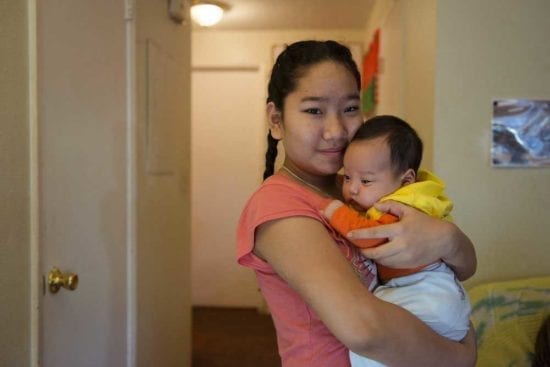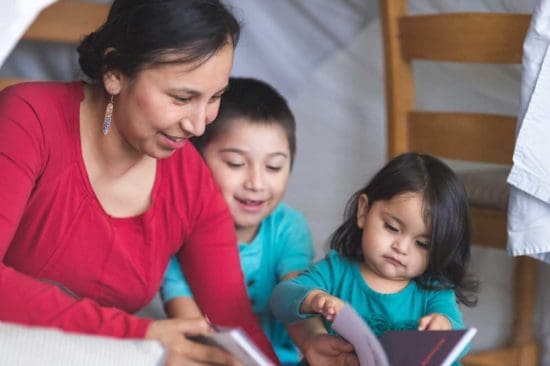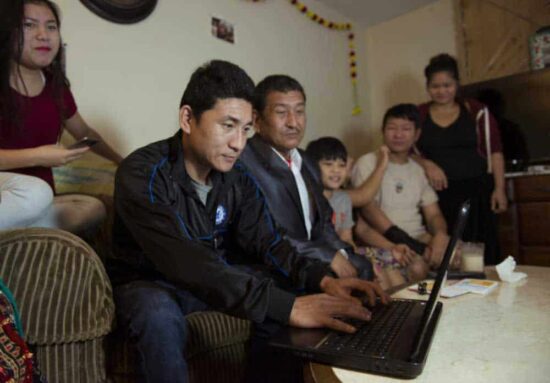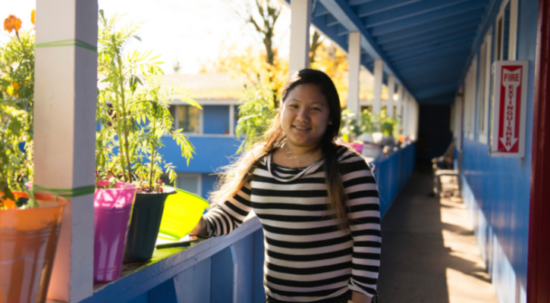Providing for child
مور او پلار او پالونکي په قانوني توګه مسؤل دي چې د خپلو ماشومانو لپاره تر هغه وخته پورې چې دوی لویان شي چمتو کړي. په ډیری ایالتونو کې، ماشومان په قانوني توګه په 18 کلنۍ کې لویان کیږي.
Parents are responsible for attending to their child’s basic needs, including:
- خواړه، جامي، او کور
- فزيکي او رواني روغتيا پا ملرنه
- عامه يا خصوصي تعليم
- Financial support
- Supervision
- Protection
دواړه والدين اړ دی چي د واده حالت ته په پام سره د خپلو ماشومانو ملاتړ وکړي. هغه والدین چی طلاق شوی وی کيداي شی د ماشوم مالۍ ملاتړ چمتو کولوته اړتيا ولري دوي پوری اړه لري چی کوم مور يا پلار د ماشوم توقیف لري
| If you are having trouble providing for your child, there are organizations that can help you pay for living expenses and find childcare. |
ناوړه ګټه اخیستنه او غفلت
ټول ایالتونه قوانین لري چې ماشومان له څلورو اصلي ډوله ناوړه چلند څخه ساتي
- Physical abuse is any act that results in a serious physical injury, such as hitting, punching, kicking, and throwing
- Emotional abuse is any acts causing emotional harm, such as insulting, making fun of, shaming, and threatening
- Sexual abuse is any forced sexual activity, inappropriate touching, or showing inappropriate photos or videos
- Neglect is failure to provide basic necessities, including food, shelter, medical care, education, and supervision
Parents who have substance abuse problems can be charged with child abuse and neglect in certain situations. Exposing children to illegal drug activity is also a crime in many states.
Each state legally requires certain people to report child abuse or neglect to the police and child welfare agencies. This can be if they know or suspect it. These mandatory reporters include social workers, health care providers, mental health professionals, teachers, school staff, child care providers, and law enforcement officers. 18 states require everyone to report child abuse and neglect.
| If you know a child experiencing abuse, contact local child protective services, Childhelp National Child Abuse Hotline, or National Center for Missing and Exploited Children. Call 911 if they are in immediate and serious danger. In most states, you can report child abuse anonymously. Your identity will not be shared with the suspected abuser. |
د قانون پلي کول او/یا د ماشومانو محافظتي خدمتونه (CPS) د ماشوم محافظت ملاتړ د ماشومانو د ناوړه ګټه اخیستنې او غفلت راپورونه بیاکتنه کوي. د ماشوم محافظت ملاتړCPS کولی شي پریکړه وکړي چې د ماشوم، کورنۍ، شاهدانو او خبریالانو سره د خبرو اترو له لارې جدي وضعیت وڅیړي. CPS به پریکړه وکړي چې آیا مداخله وکړي ترڅو ډاډ ترلاسه کړي چې ماشوم او کورنۍ خوندي دي. هر ډول مداخله د ماشوم مخا فظت ملاتړ به د ماشوم په غوره ګټو کې وي
په ډیرو مواردو کې، د ماشوم مخا فظت ملاتړCPS والدینو ته اړتیا لري چې د ټولنیز کارکونکي سره وګوري ترڅو د خوندیتوب اندیښنو په اړه خبرې وکړي. ټولنیز کارکونکی کولی شي د مور او پلار سره مرسته وکړي چې په کور کې د ماشوم لپاره په خوندي توګه چمتو کولو لارې وپیژني.
په ځینو مواردو کې، د ماشوم د ساتنې ملاتړ CPS ممکن ماشوم له موراو پلار څخه لرې کړي که چیرې دوی په خطر کې وي. موراو پلار باید وښيي چې څنګه کولی شي په خوندي چاپیریال کې د خپل ماشوم پاملرنه وکړي مخکې له دې چې د ماشوم محافظت ملاتړCPS خپل ماشوم بیرته کور ته واستوي. د ماشومانو د ناوړه استفادې په سختو قضیو کې، د ماشوم محافظت ملاتړ ممکن محکمه وغواړي چې د والدینو حقونه لغوه کړي.
Discipline is intended to teach children how to behave properly. Child abuse is an act intended to harm children. Forms of child abuse include physical, emotional, and sexual harm, and neglect. Discipline can turn into child abuse when used to punish and harm children for bad behavior.
Leaving a child home alone
Many state laws consider leaving a young child unsupervised as neglect especially when it puts them at risk of harm or danger. Although, most states do not have laws identifying a minimum age for leaving a child home alone.
دا مهمه ده چې د خپل ماشوم اړتیاوو، عمر، فزیکي روغتیا، او احساساتي هوساینې په اړه فکر وکړئ مخکې له دې چې پریکړه وکړئ په کور کې یوازې پریږدئ. تاسو باید دا هم په پام کې ونیسئ چې تاسو به څومره وخت ته لاړ شئ او د کور چاپیریال چې ستاسو ماشوم به په کې پاتې شي.
| If you or your child does not feel safe being left home alone, consider your childcare options. |
School
که تاسو د ښوونځي عمر لرونکي ماشوم مور یا پلار یاست، تاسو مختلف اړتیاوې او حقونه لرئ.
Parents are legally required to have their children go to school. This can include public or private schools as well as home school programs. State laws vary on what age children are required to start school and when they can drop out. Parents are required to make sure their children attend school regularly and follow school rules of conduct.
Parents have the right to ask for changes to their child’s school classes and activities based on their child’s needs. Parents can choose to opt their children out of certain classes and standardized testing. Schools have to make reasonable accommodations to make sure certain people have an equal opportunity to succeed in school. This includes students with different language skills, disabilities, religions, and gender identities.
Parents have the right to ask for help with their child’s safety in school. Schools must tell parents if their child is being bullied or bullying other students. Parents can also report bullying and discrimination to school staff. Schools must respond to these reports and make an effort to improve the safety of students.
| Learn more about sending your child to school in the USA. |
نور مهم قوانین
Parents are responsible for supervising teenage drivers especially when they have a learner’s permit.
Parents cannot force their children to marry against their will. However, parents can allow their children to marry at the age of 16-17 if state law requires parental permission for those under 18.
Tips on raising children new to the USA
والدین کیدل تل آسانه ندي. دا په ځانګړې توګه د هغو کورنیو لپاره سخته کیدی شي چې نوي هیواد سره سمون لري. مهاجر والدین او ماشومان د ډیری بې ساري ننګونو سره مخ دي.
Talk to your child about your feelings and experiences adjusting to American culture. It’s okay if your child seems to adapt more quickly to American culture than you. Talk about ways you both can become involved in your local community together. Practice learning English with your child and participate in community activities together.
Offer your child opportunities to stay connected to your culture. Have conversations in your native language. Read books and watch films in your native language. Cook traditional recipes together. Share your favorite traditions from your home country. Join community groups for people from your home country.
Reach out to families, friends, and professionals for support. If you are having problems with your child, it can be helpful to reach out for help. Talk with your child, family members, friends, and service providers to find solutions that work. Learn about finding mental health services.
Find help
Find more resources for parents and teens who are new to the USA.
سرچینه | وړاندیزونه |
|---|---|
A guide for immigrant parents raising children in the U.S. Available in English, Arabic, Spanish, Nepali, and Somali | |
Local child care resources, health, and social services, and financial assistance for each state | |
Resources for immigrant and refugee families | |
Guide for creating a family emergency and parenting plan | |
Emotional support over the phone and parenting resources online | |
Emotional support for teens looking for help and online resources for teens, parents, and caregivers | |
Local community resources, including crisis & emergency, food, housing, and health |
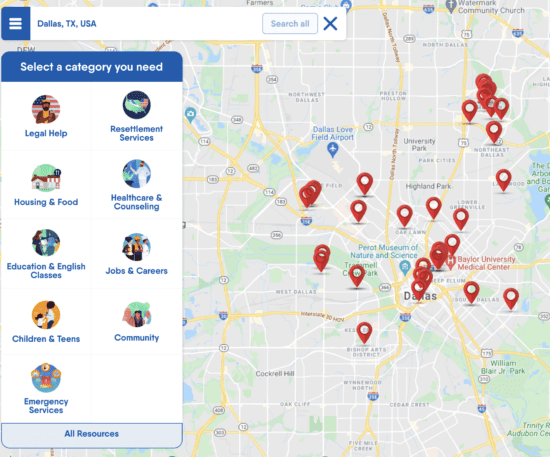
قانوني مرسته، د انګلیسي ژبې ټولګي، روغتیایي کلینیکونه، د هیستوګنځاې اړوند مرسته، او داسې نور شیان ومومئ. په FindHello اپلیکیشن کې په متحده ایالاتو کې د کډوالو لپاره سیمه ایزه نقشه او د خدماتو لیست لپاره لټون وکړئ.
ددې پاڼي معلومات له USA.gov, the U.S. Department of Health & Human Services, او نورو باوري سرچینو څخه په لاس راغلی دي. زموږ موخه دا ده چې د پوهیدلو لپاره اسانه معلومات وړاندې کړو کوم چې په منظم ډول تازه کیږي. دا معلومات حقوقي مشوره نه ده.
